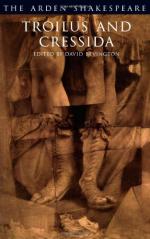|
This section contains 3,968 words (approx. 14 pages at 300 words per page) |

|
SOURCE: “The Idealism of Shakespeare's Troilus,” in South Atlantic Review, Vol. 51, No. 1, January, 1986, pp. 19-29.
In the following essay, Lynch argues that the so-called idealism of Troilus is not as pure as some commentators have suggested, but is instead as self-absorbed and corrupt as the world Troilus himself inhabits.
Troilus inhabits a world of near total corruption where honor serves ambition and love seems little more than lust. Yet within the confines of this bleak and hostile world, Troilus appears extraordinarily idealistic. He describes his will as “infinite,” his desire as “boundless,” and his truth as a “winnowed purity in love” (3.2.82-83, 167). Even after the betrayal scene he claims, “Never did young man fancy / With so eternal and so fix'd a soul” (5.2.165-66). Several commentators have interpreted this hero as a rare and noble exception to the characters that surround him (see, for example, Knight 60; Nowottny 291-93; Biswas...
|
This section contains 3,968 words (approx. 14 pages at 300 words per page) |

|


